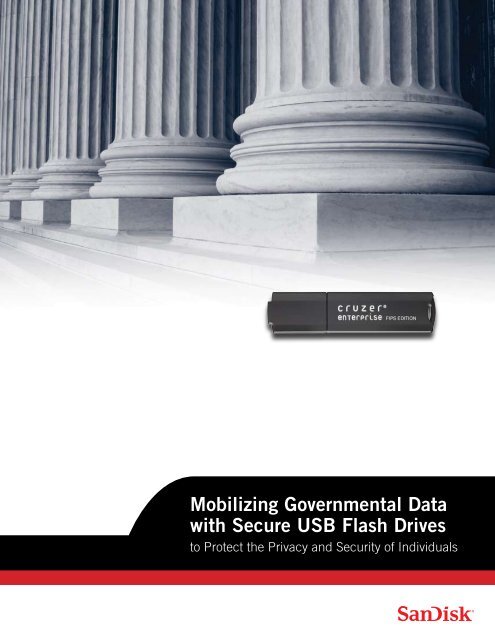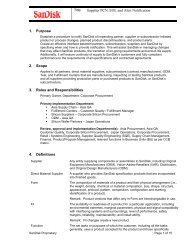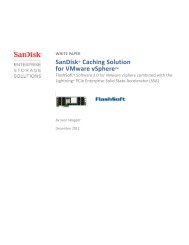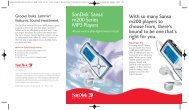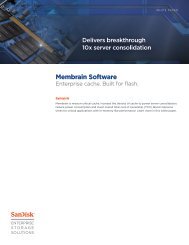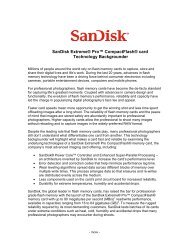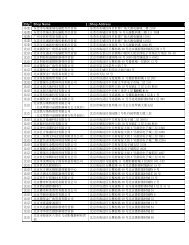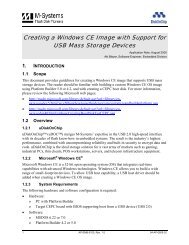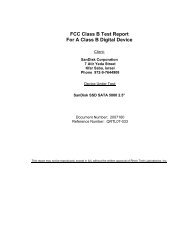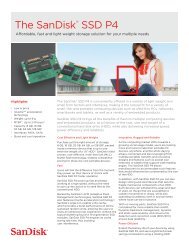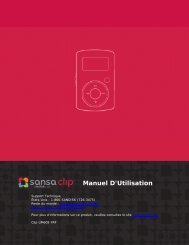Mobilizing Governmental Data with Secure USB Flash ... - SanDisk
Mobilizing Governmental Data with Secure USB Flash ... - SanDisk
Mobilizing Governmental Data with Secure USB Flash ... - SanDisk
Create successful ePaper yourself
Turn your PDF publications into a flip-book with our unique Google optimized e-Paper software.
<strong>Mobilizing</strong> <strong>Governmental</strong> <strong>Data</strong><br />
<strong>with</strong> <strong>Secure</strong> <strong>USB</strong> <strong>Flash</strong> Drives<br />
to Protect the Privacy and Security of Individuals
For government agencies, loss of data or a security breach<br />
can pose a national security risk. Because of this, many<br />
government agencies are now developing compliance<br />
strategies to secure confidential data.<br />
Satisfying All Industry Requirements<br />
With millions of <strong>USB</strong> flash drives in use, digital data<br />
is constantly on the move. <strong>Flash</strong> drives let users easily<br />
store, transport and share their photos, videos and<br />
text files. But when it comes to government agencies,<br />
the very same benefits that enable employees to work<br />
effectively outside the office pose risks of the loss,<br />
theft or misuse of unprotected, confidential data.<br />
The <strong>SanDisk</strong> ® Cruzer ® Enterprise <strong>USB</strong> flash drive<br />
provides an unparalleled level of safety and security for<br />
sensitive government information and its management.<br />
Combating <strong>Data</strong> Loss<br />
Today’s headlines recount the grim realities of various<br />
government and private organizations losing data or having<br />
their data compromised. Examples of these accounts<br />
include security breaches in the U.S. Department of<br />
Veterans Affairs related to lost or stolen portable data<br />
devices that have resulted in class action suits on behalf of<br />
28,600,000 veterans. 1<br />
The extremely devastating consequences of data<br />
compromise and security breaches are no less severe <strong>with</strong><br />
smaller but more frequent data losses. Research of data<br />
breaches by the Ponemon Institute has established that,<br />
on average, a single loss of 30,000 individuals’ personally<br />
identifiable information can cost an organization nearly $6<br />
million in internal investigation, notification and regulatory<br />
compliance expenses. 2 Federal agencies have even been<br />
held liable in class action suits on behalf of those whose<br />
personal information has been compromised. In the private<br />
enterprise sector, potential damage resulting from noncompliance<br />
to security standards may also result in fines,<br />
loss of business and/or legal sanctions.<br />
Recently, the US government has taken a tougher stance<br />
in enforcing security standards for sensitive information.<br />
Security measures are being put in place to protect<br />
sensitive data, particularly people’s identity data, from<br />
being lost or stolen. This is a relatively new crime that<br />
impacts millions of Americans.<br />
On July 3, 2007, John Grimes, the CIO for the Department<br />
of Defense, issued a new policy requiring that all sensitive<br />
but unclassified (SBU) data stored on mobile devices<br />
be encrypted according to NIST’s Federal Information<br />
Processing Standard (FIPS) 140-2. The prior year, the<br />
Office of Management and Budget issued Memorandum<br />
M-06-16, directing all Federal agencies and departments to<br />
encrypt all sensitive data on mobile computers and devices.<br />
The challenge that government agencies are facing to<br />
secure sensitive data can become daunting when taking<br />
into account how much information is transported on<br />
personal storage devices. The majority of personal storage<br />
devices are neither built to keep data completely secure nor<br />
to give government agencies the control they need to audit<br />
files being copied or deleted from various networks. Rather<br />
than undergo time-consuming data classification exercises<br />
in all cases, it is apparent from the recent government<br />
policies mentioned below that encryption of data is the best<br />
choice for mobile devices.<br />
Central Control, Increased Protection<br />
<strong>SanDisk</strong> Cruzer Enterprise FIPS Edition <strong>USB</strong> flash drive<br />
<strong>with</strong> central management and control (CMC) software is<br />
designed to meet the requirements of government agencies<br />
by complying <strong>with</strong> regulations such as FISMA and PCI that<br />
require secure storage of sensitive information.<br />
CMC is an innovative, client-server software solution that<br />
utilizes the unique hardware and embedded software<br />
capabilities of <strong>SanDisk</strong> Cruzer Enterprise FIPS Edition <strong>USB</strong><br />
flash drives. The CMC device agent resides on the <strong>USB</strong><br />
flash drive, enabling IT departments to centrally manage<br />
company-issued Cruzer Enterprise FIPS Edition <strong>USB</strong><br />
flash drives − locally and remotely, <strong>with</strong>in and outside the<br />
corporate environment.<br />
1<br />
PC World, “Laptop losers hall of shame,” Carolyn Duffy Marson, May 26, 2008, http://www.pcworld.idg.com.au/index.php/id;105254216;img;5220;ssid;1<br />
2<br />
Price Waterhouse Coopers, “Quarterly in law,” Feb 2008, p. 3, http://www.pwc.co.uk/pdf/quarter_in_law.pdf
CMC provides many functions such as constant monitoring,<br />
auditing and tracking. Depending on an organization’s<br />
particular needs, these functions can incorporate various<br />
parameters set for various levels of restrictions and<br />
monitoring.<br />
Attaining centralized deployment and provisioning is<br />
another feature <strong>with</strong> tremendous benefits. IT departments<br />
can also deploy centralized updates and configurations of<br />
all drive parameters, administer passwords and remotely<br />
deactivate lost or stolen drives.<br />
Encryption That Ensures the Ultimate Protection<br />
<strong>SanDisk</strong> Cruzer Enterprise FIPS Edition <strong>USB</strong> flash drive<br />
uses a number of powerful security features, including:<br />
hardware-based 256-bit AES encryption, the most secure<br />
block cipher encryption standard adopted to date, complex<br />
password protection and a lock-down mechanism. This<br />
mechanism is activated when a set number of incorrect<br />
password attempts is exceeded in order to ensure that<br />
data on lost or stolen drives cannot be hacked into. These<br />
security features protect confidential data and at the same<br />
time enable authorized employees to transfer data freely,<br />
even when sensitive information needs to be transferred to<br />
different computers or workstations.<br />
Increasing Productivity<br />
Government agencies do not want to be forced to choose<br />
between mobility, ease of use, productivity and security.<br />
Complex mobile encryption that is not embraced by users<br />
decreases security and hinders worker efficiency. The<br />
<strong>SanDisk</strong> Cruzer Enterprise FIPS Edition <strong>USB</strong> flash drive,<br />
when used <strong>with</strong> <strong>SanDisk</strong> CMC software, increases overall<br />
enterprise data security by providing centrally managed,<br />
secure mobile storage that is transparent to the end<br />
user. In this way, both productivity and security remain<br />
at high levels.<br />
Privacy Monitoring Throughout the System<br />
The Cruzer Enterprise FIPS Edition <strong>USB</strong> flash drive, when<br />
managed by CMC software, could be set to limit the use of<br />
government-issued <strong>USB</strong> flash drives to only governmentowned<br />
PCs. It also maintains a full audit trail of files<br />
copied, modified or deleted both on and off the network.<br />
Protection this thorough is essential not only to meet legal<br />
requirements but to provide government agencies <strong>with</strong><br />
ultimate protection.<br />
In addition, circumventing reliance on users through<br />
mandatory 100% data encryption of all files helps prevent<br />
human error. The Cruzer Enterprise FIPS Edition flash<br />
drive also enables business continuity through seamless<br />
backup of drive content and the ability to restore or<br />
recreate data resident on lost or stolen drives.
<strong>Mobilizing</strong> <strong>Governmental</strong> <strong>Data</strong><br />
<strong>with</strong> <strong>Secure</strong> <strong>USB</strong> <strong>Flash</strong> Drives<br />
to Protect the Privacy and Security of Individuals<br />
Key Mandates to Protect <strong>Data</strong> in the U.S.<br />
Government<br />
Federal Information Security Act (FISMA) of 2002<br />
established broad security requirements for U.S. Federal<br />
Government agencies and contractors. Encryption controls<br />
are required as a result of risk assessments according to<br />
NIST guidelines.<br />
OMB Memorandum M-06-16 requires that agencies<br />
encrypt all data on mobile devices unless the agency has<br />
determined that data to be non-sensitive.<br />
The Department of Defense (DoD) issued tightened<br />
policies in July 2007 requiring encryption for sensitive but<br />
unclassified data on mobile devices.<br />
FIPS 140-2 establishes cryptographic requirements and<br />
defines four increasing robust security levels for encrypting<br />
data.<br />
Payment Card Industry / <strong>Data</strong> Security Standards (PCI/DSS)<br />
requires encryption of credit card encryption. (Ver 1.1,<br />
Section 3), which applies to several governmental agencies.<br />
Central Management & Control (CMC) software:<br />
• Manages the complete lifecycle of<br />
company-issued <strong>USB</strong> flash drives<br />
Product Highlights<br />
• Protects against unauthorized use of sensitive<br />
company data<br />
• Protects against possible regulatory compliance<br />
failure and associated damages caused by data<br />
breaches due to lost or stolen <strong>USB</strong> drives<br />
• Supports regulatory compliance by tracking and<br />
auditing activity, as well as demonstrating the<br />
use of strict encryption measures<br />
<strong>SanDisk</strong> Corporation<br />
Corporate Headquarters<br />
601 McCarthy Blvd.<br />
Milpitas, CA 95035<br />
For more information,<br />
please visit<br />
www.sandisk.com/enterprise<br />
or email enterprise@sandisk.com<br />
<strong>SanDisk</strong> and the <strong>SanDisk</strong> logo are trademarks of <strong>SanDisk</strong> Corporation, registered in the United States and other<br />
countries. Trusted<strong>Flash</strong> is a trademark of <strong>SanDisk</strong> Corporation. microSD and SD are trademarks. Other brand names<br />
mentioned herein are for identification purposes only and may be trademarks of their respective holder(s).<br />
© 2008 <strong>SanDisk</strong> Corporation. All rights reserved. xx-xx-xxxx Rev. 2.0, March 2008


